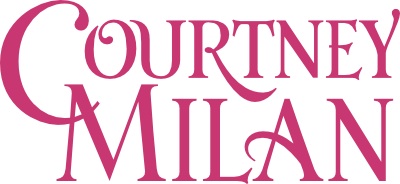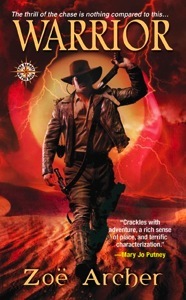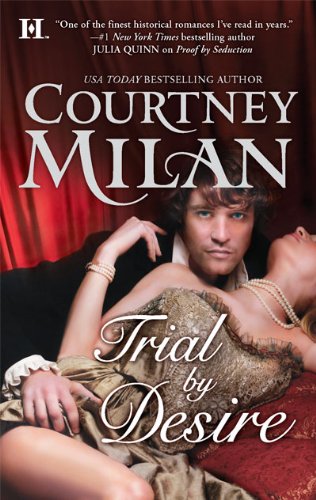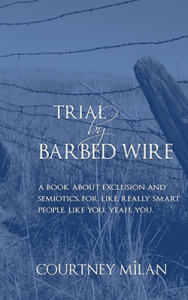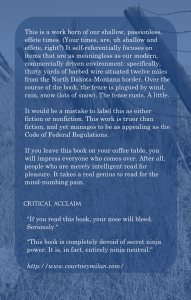First things first: the winner of Trial by Barbed Wire is… SonomaLass! Congratulations, SonomaLass! Send me your address.
Second things second: I’m in the mid-book frenzy of writing my fourth book, which is titled Unclaimed (Unclaimed follows Unveiled, my third book, which will be out in late January of 2011–it will be out sometime in the fall of 2011). Back in June when I was in England, I was doing research for this book (among other things). And if you’re curious what this book is about… well, you can read the basic description on my website, for one. But I decided to add the research books I have open on my desk at this very moment to my research shelf on Goodreads. And that will…not give you any idea at all, except that the book is set partially in Shepton Mallet and partially in Bristol.
I’ve become a little hazy about talking books while I am writing them, because I have written enough to know that it’s rarely a good idea to talk about a book while writing it, because I am either wildly optimistic or wildly pessimistic about its worth.
My process looks like this.
Step One: I write the first scene of the book. Sometimes I write the second scene of the book. Usually, these scenes are the work of some wild and crazy genius, and I can’t believe how perfect I am. This is it! This is going to be the easy book, the one that writes itself with just a hint of work on my part!
Step Two: I write a synopsis for the book. The synopsis highlights two or three things I know have to happen, talks a lot about back story which is unlikely to be the actual backstory of the characters, and makes vague allegations that other things, in fact, also happen. It is designed to convince my publisher (and myself) that I am writing a Real Book, with a beginning, middle, and an end.
Step Three: I write enough scenes near the front of the book to make it look like I have a good start. These, I send to my editor along with the synopsis, so she can see that I am in fact, writing a real book. (Sometimes, these scenes actually end up in the middle of the final book, or get cut altogether, so I’m really faking this part.)
Step Four: I write whatever scenes I think have to happen in the book without reference to when or wherever. I write totally out of order. For a month or so, it is a frenzy of writing–these are the easy scenes, the ones that automatically spring to mind. These scenes suggest still other scenes that must be written. I am exuberant. I ride on a heavy wave of exhilaration. This is the point when I am convinced this is the best book I have ever written, bar none.
Step Five: I have written all the easy scenes, in no particular order. Now I have to try and weave them into a story–filling gaps, figuring out how to get from Point A to Point B. I realize that Brilliant Scene Number 3 conflicts with Brilliant Scene Number 8: they cannot have two first kisses! I grudgingly start deleting, editing, revising, tweaking. At this point, I also begin to realize that Brilliant Scene Number 3…is not so brilliant anymore. In fact, it’s kind of stupid. I rewrite it. I try Brilliant Scene Number 8 in its place. Nothing works. Heck, it’s not even a cogent story. It’s a set of anecdotes. I don’t know what I was thinking.
Step Six: I feel as if I am this close to finishing the book, if only I could solve this one persistent problem! But solving it means that I just have to close this last gap…and then that creates another problem here…
Step Seven: I decide this is the stupidest book ever written. All my efforts to fix it only make it stupider. Why am I working on it? It’s never going to be good anyway. This is the worst book ever. My career is over. Eventually, I can no longer stand to look at it any longer without shrieking. I save the file and send it to my editor in a fit of pique. Often, it is accompanied by a note that declares something like: “This book is plagued by three unfixable problems, and it sucks. Sorry.” Or, perhaps: “There’s a long stretch of crap in the middle and I don’t know how to fix it.” (I have toned down what I actually say for public consumption.)
Step Eight: My editor reads it. She gets back to me. She says things like, “I really like this book!” Secretly, I doubt her taste, and I decide that she must be a liar, since she can say all that without bursting into hysterical laughter. Then she points out lots and lots of things that would make the book better, and I decide that even if she is lying about liking it, she is a genius.
Step Nine: I tackle her list of things to make the book better. Some of the stuff is easy, like clarifying sentences. Some of it looks like it will be easy–things like, “isn’t her reaction a little understated here?”–but when I try to fix it, I realize the whole scene is wrong and I have to rewrite it. Eventually, I get to the point where I can send it to her again. If I am doing really well by the book, I say something like, “Okay, it’s not that bad any more.”
Step Ten: She sends it back, with another list of things to fix. Repeat. By the time I get to the end of fixing these, my eyes are usually bleeding.
Step Eleven: Mercifully, I get a little rest. Then I have to look at the final typeset version of the pages for errors. I pray I find them all. While reading, I am filled with impotent fury at all the things that I want to change, but cannot, because I am only looking for errors.
If you cannot tell, once I get past step four in the book writing, I start to grumble.
Right now, I am on Step 5 in Unclaimed. This is the “everything sucks!” phase. Luckily, once I get through it, I’ll be in the “this book is almost done…once I write one last scene and fix that little bit in Chapter 14!” phase. I’ll be there for a solid month. And that is why I’m not talking about this book until it’s done–because until then, just about everything can (and at some point, will) go.
